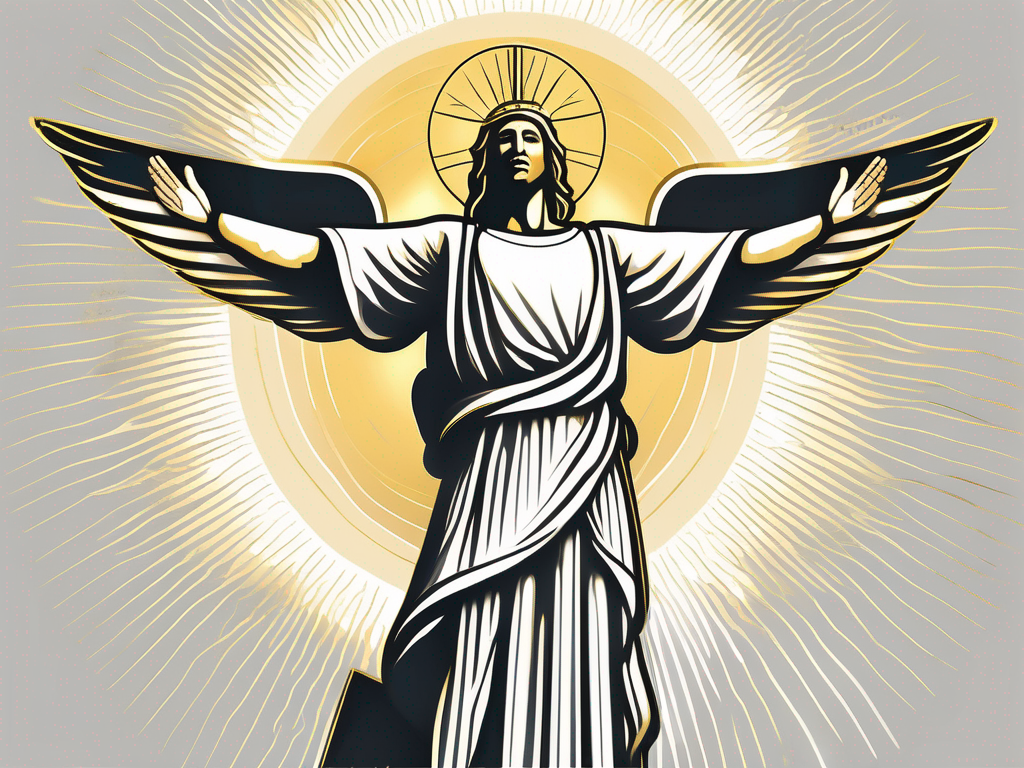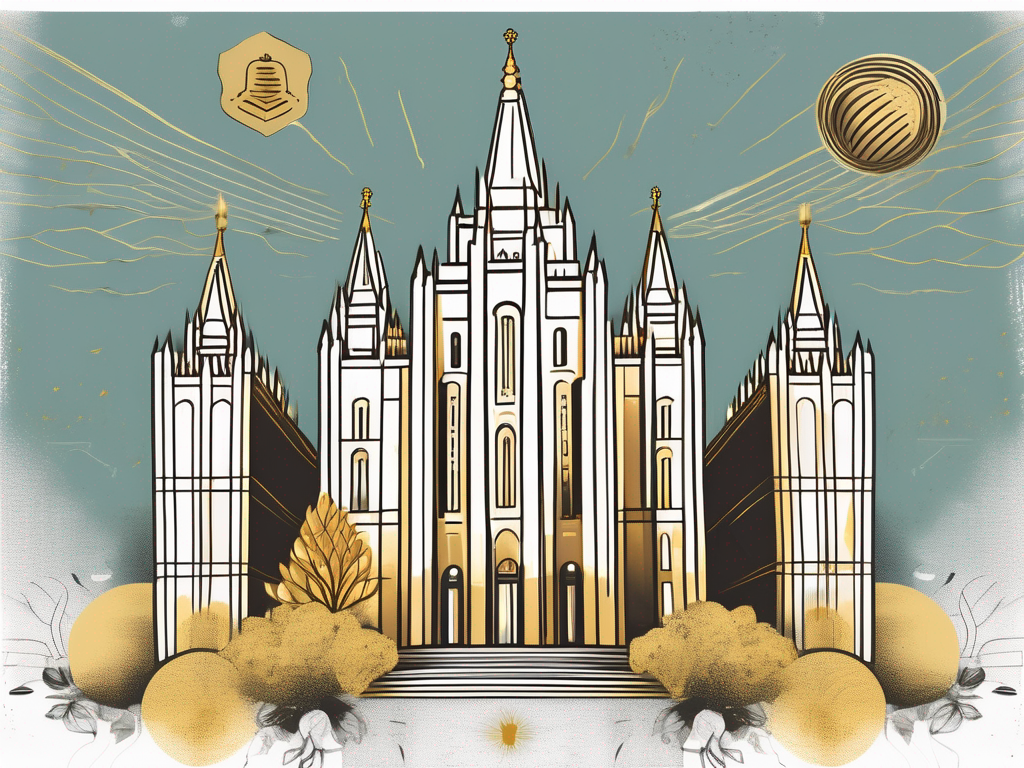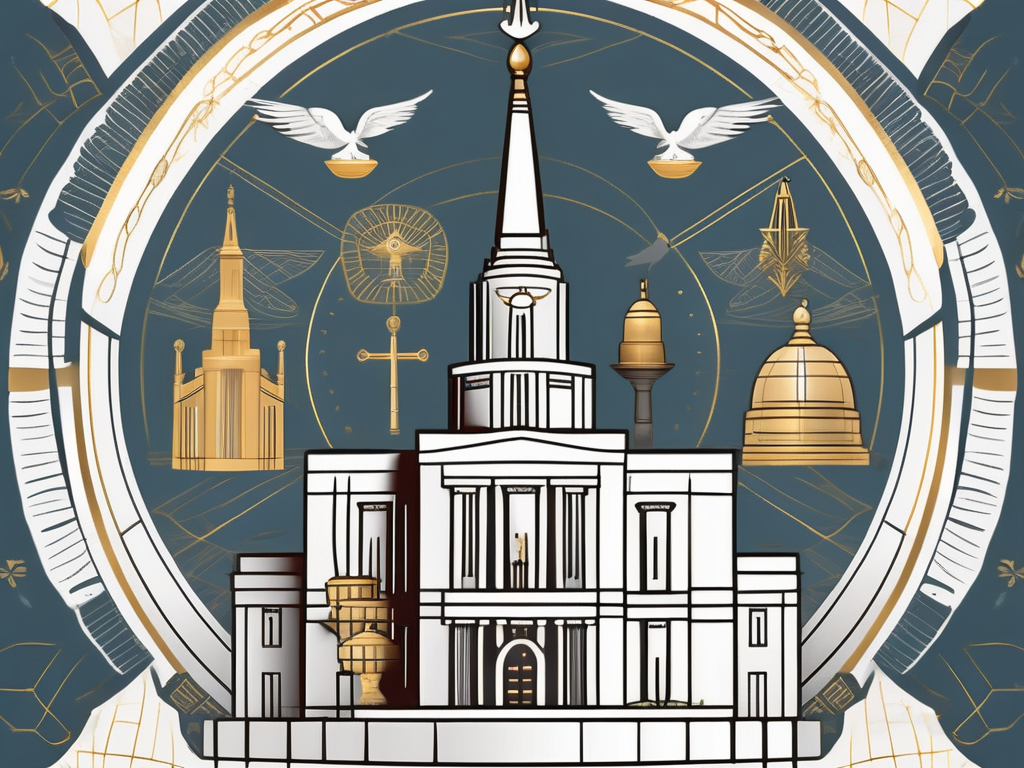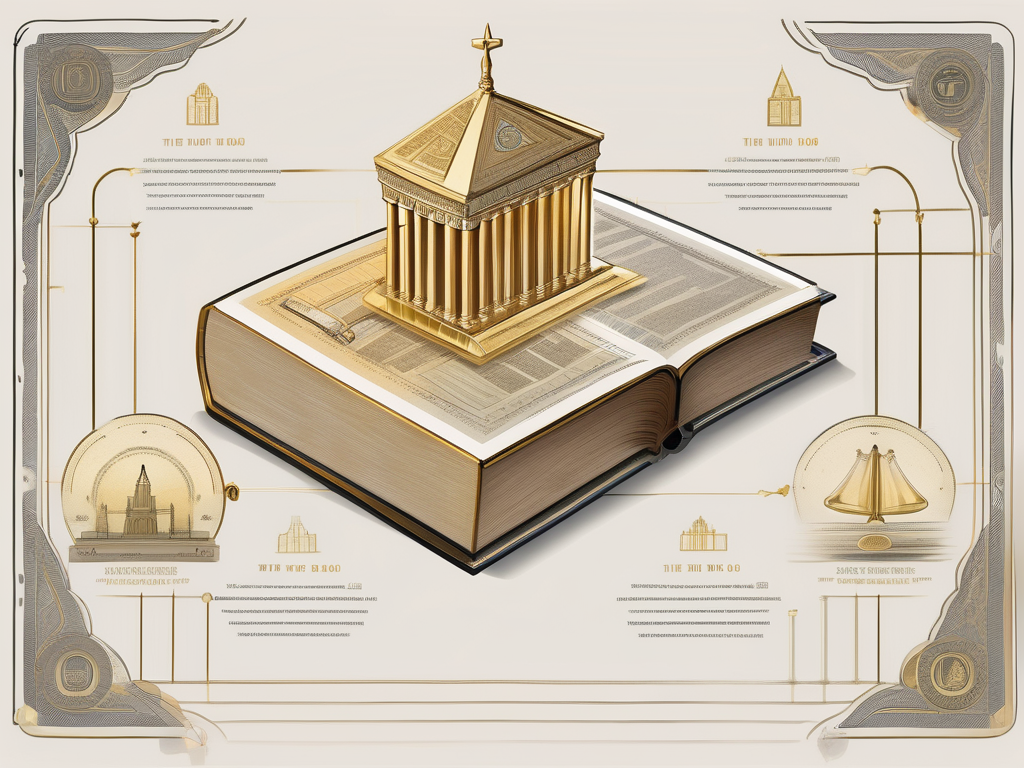Salvation is a central theme in the beliefs of The Church of Jesus Christ of Latter-day Saints, commonly known as the Mormon Church. For Mormons, salvation encompasses more than just the forgiveness of sins, but also the opportunity to become like Heavenly Father and live with Him again. In this article, we will explore the concept of salvation in Mormonism, the role of Jesus Christ, the principles of faith and repentance, the belief in afterlife and exaltation, the significance of temples and family, and address common misconceptions surrounding Mormon salvation.
Understanding the Concept of Salvation in Mormonism
Mormons believe that salvation is a process that starts with the Atonement of Jesus Christ. It is through His sacrifice and resurrection that all people have the opportunity to be saved. It is essential to understand that Mormons believe in both grace and works as necessary components of salvation.
When it comes to understanding the concept of salvation in Mormonism, it is important to delve deeper into the role of Jesus Christ. Mormons believe that Jesus Christ is not only the Son of God but also the Savior and Redeemer of the world. Through His Atonement, Jesus Christ paid the price for our sins and overcame death. His sacrifice is seen as the ultimate act of love and mercy, offering redemption and forgiveness to all who accept Him as their Savior.
However, Mormons also emphasize the importance of personal effort and works in the process of salvation. While they believe in the grace of Jesus Christ, they also believe that individuals have a responsibility to actively participate in their own salvation. This includes following the teachings of Jesus Christ, living a righteous life, and striving to keep God’s commandments.
The Role of Jesus Christ in Salvation
Jesus Christ plays a central role in Mormon salvation. Mormons believe that Jesus Christ is the Son of God, the Savior and Redeemer of the world. Through His Atonement, Jesus Christ paid the price for our sins and overcame death. By accepting Him as our Savior and following His teachings, Mormons believe that we can be forgiven of our sins and find redemption.
It is through the Atonement of Jesus Christ that Mormons believe they can find hope and healing. His sacrifice provides the opportunity for individuals to repent, turn away from their sins, and become more like Him. Mormons strive to emulate the example of Jesus Christ in their daily lives, seeking to love and serve others as He did.
Furthermore, Mormons believe that Jesus Christ is not only the Savior of individuals but also the Savior of the world. His Atonement extends to all people, regardless of their background or circumstances. Mormons believe that through the grace of Jesus Christ, all individuals have the opportunity to be saved and find eternal life.
The Plan of Salvation: A Mormon Perspective
In Mormonism, the Plan of Salvation is a comprehensive framework that outlines God’s plan for His children. This plan includes the pre-mortal life, mortal life on earth, and the afterlife. Mormons believe that we lived with God as His spirit children before we were born on earth and that our time here is a crucial part of our eternal progression.
The Plan of Salvation provides Mormons with a broader understanding of their purpose and potential. It teaches that life on earth is a testing ground, where individuals are given the opportunity to learn and grow. Mormons believe that the challenges and experiences of mortal life are meant to help them develop virtues, exercise agency, and make choices that will shape their eternal destiny.
Additionally, the Plan of Salvation includes the opportunity for all people to receive essential ordinances and covenants, such as baptism and receiving the gift of the Holy Ghost. These ordinances are seen as necessary steps in the path to salvation and eternal life. Mormons believe that through these sacred rituals, individuals can receive divine blessings and guidance, enabling them to progress spiritually and draw closer to God.
Furthermore, Mormons believe in the concept of eternal families. They believe that through the sealing power of the priesthood, families can be bound together for eternity. This belief brings great comfort and hope, as it emphasizes the eternal nature of relationships and the potential for continued growth and progression beyond this life.
In conclusion, understanding the concept of salvation in Mormonism goes beyond a simple belief in Jesus Christ as the Savior. It involves recognizing the central role of Jesus Christ in the process of salvation, the importance of personal effort and works, and the comprehensive framework of the Plan of Salvation. For Mormons, salvation is not just a one-time event but a lifelong journey of faith, repentance, and discipleship.
The Principles of Faith and Repentance in Mormon Salvation
Mormons believe that faith and repentance are vital principles in the process of salvation. Faith in Jesus Christ means having a sincere belief in Him and His gospel. It involves trusting in His teachings, relying on His Atonement, and striving to live according to His commandments.
When Mormons speak of faith, they emphasize the importance of not just believing in Jesus Christ, but also actively applying His teachings in their daily lives. This includes developing a personal relationship with Him through prayer, studying the scriptures, and seeking guidance from the Holy Spirit. Mormons believe that faith is not just a passive belief, but a dynamic force that motivates them to act in accordance with their beliefs.
Repentance, on the other hand, is seen as an essential step in the process of salvation. It involves recognizing and acknowledging one’s sins, feeling genuine remorse for them, and making a commitment to change. Mormons believe that through sincere repentance, individuals can receive forgiveness for their sins and experience a spiritual rebirth.
The Importance of Baptism in the Path to Salvation
For Mormons, baptism is a sacred ordinance that symbolizes a person’s commitment to follow Jesus Christ. It represents a covenant made with God to keep His commandments. Mormons believe that baptism by immersion is necessary for the remission of sins and the entrance into the kingdom of God.
Baptism is not just a symbolic act but a transformative experience in the life of a Mormon. It is a moment of spiritual rebirth, symbolizing the cleansing of sins and the start of a new life in Christ. The act of being fully immersed in water represents the burial of the old self and the emergence of a new, dedicated disciple of Jesus Christ.
When a person is baptized, they make a solemn commitment to follow Jesus Christ and strive to live according to His teachings. This commitment extends beyond the baptismal font and becomes a guiding principle in their everyday life. Mormons believe that baptism is a necessary step on the path to salvation and an essential part of their journey to become more like Jesus Christ.
The Doctrine of Enduring to the End
Mormons believe that true salvation requires not only the initial faith and repentance but also a lifelong commitment to following Jesus Christ. This commitment includes enduring to the end by faithfully keeping the commandments, continually repenting, and seeking to improve and grow in righteousness. Mormons see salvation as an ongoing journey rather than a one-time event.
Enduring to the end is a concept deeply ingrained in Mormon theology. It emphasizes the need for consistent effort and dedication in living a Christ-centered life. Mormons believe that salvation is not achieved through a single act or moment of conversion but through a lifetime of faithful discipleship.
Enduring to the end involves facing challenges and trials with faith and resilience. It means staying true to one’s beliefs and principles, even when faced with opposition or adversity. Mormons believe that by enduring to the end, they can receive the ultimate reward of eternal life in the presence of God.
Therefore, Mormons strive to continually improve themselves, seeking personal growth and spiritual development. They understand that salvation is a process that requires constant effort, self-reflection, and reliance on the grace of Jesus Christ.
The Mormon Belief in Afterlife and Exaltation
Mormons have a unique perspective on the afterlife and believe in the potential for eternal progression. They believe that after death, individuals enter one of three degrees of glory: the celestial, terrestrial, or telestial kingdom. Each kingdom represents different levels of spiritual progression and closeness to God.
Let’s delve deeper into these three degrees of glory and explore the fascinating details that Mormons believe in.
The Celestial Kingdom: Living in the Presence of God
The celestial kingdom is the highest degree of glory, where Mormons believe they can live in the presence of God and receive all of His blessings. It is a realm of unimaginable beauty and eternal joy. In this kingdom, individuals enjoy the fullness of God’s glory and experience an eternal union with their loved ones. They believe that families can be sealed together for eternity through sacred ordinances performed in Mormon temples.
Within the celestial kingdom, there are even higher levels of exaltation. Mormons believe that those who have faithfully followed the teachings of Jesus Christ and received additional ordinances and covenants can become gods and goddesses, ruling over their own worlds and creating eternal progeny. This concept, known as exaltation, is a central tenet of Mormon theology and underscores their belief in the potential for eternal progression.
The Terrestrial Kingdom: A Place of Great Glory
The terrestrial kingdom is a place of great glory, where honorable individuals who did not have the opportunity to accept the fullness of the gospel dwell. Mormons believe that those who led good lives but did not embrace the fullness of the Mormon faith can still experience a measure of divine blessings in this kingdom. While they do not dwell in the immediate presence of God, they enjoy a level of peace, happiness, and fulfillment that surpasses mortal comprehension.
In the terrestrial kingdom, individuals continue to learn and progress, but their growth is limited compared to those in the celestial kingdom. They have the opportunity to receive further knowledge and understanding, but their eternal potential is not as expansive as those who attain exaltation.
The Telestial Kingdom: Righteousness to Some Degree
The telestial kingdom is for those who did not accept the gospel on earth but were still righteous to some degree. Mormons believe that even those who did not fully embrace the teachings of Jesus Christ can find a place of relative happiness and glory in this kingdom. While they do not experience the same level of divine blessings as those in the celestial or terrestrial kingdoms, they are not consigned to eternal suffering or damnation.
Within the telestial kingdom, individuals have the opportunity to progress and learn from their experiences. They continue to grow and develop, albeit at a slower pace compared to those in the higher degrees of glory. Mormons believe that God’s love and mercy extend to all of His children, and even in this kingdom, individuals can find peace and fulfillment.
Outer Darkness: Reserved for the Most Severe Sins
Mormons also believe in outer darkness, a state reserved for those who have committed the most severe sins and rejected the light of Christ. It is a place of complete separation from God’s presence and eternal torment. However, Mormons emphasize that only a small number of individuals will ultimately end up in this state. They believe that God’s mercy and justice will prevail, and the vast majority of His children will find a place in one of the three degrees of glory.
The Concept of Eternal Progression: Becoming More Like God
Mormons believe in the concept of eternal progression, which means that individuals have the potential to continue learning, growing, and developing throughout eternity. This belief underscores the idea that salvation is not just about achieving an eternal reward but also about continually progressing in knowledge, wisdom, and personal attributes, becoming more like God.
In the celestial kingdom, Mormons believe that the process of eternal progression continues, as individuals strive to become gods and goddesses, creating and governing their own worlds. They believe that this eternal journey of growth and development is an essential part of God’s plan for His children.
Overall, the Mormon belief in afterlife and exaltation is a complex and profound doctrine that offers a unique perspective on the eternal nature of the human soul. It emphasizes the potential for eternal progression and the eternal nature of families, bringing hope and comfort to Mormons as they strive to live according to their faith.
The Role of Temples and Family in Mormon Salvation
Temples are significant in Mormon salvation because they are regarded as a place where sacred ordinances, including those essential for salvation, are performed. Mormons believe that through these ordinances, families can be sealed together for eternity, creating an eternal bond.
The Practice of Baptism for the Dead
One unique practice Mormons engage in is the performance of baptism and other ordinances on behalf of deceased individuals. They believe that these vicarious ordinances allow those who have passed away without the opportunity to receive them in mortality to still have the chance to accept or reject them in the spirit world.
The Eternal Nature of Families in Mormonism
Mormons cherish the belief that families can be together forever. Through the sealing power of the priesthood, which is believed to be restored in modern times, Mormons believe that families can be united in the eternities, bringing great joy and comfort.
Common Misconceptions About Mormon Salvation
Unfortunately, there are many misconceptions surrounding Mormon beliefs about salvation. It is essential to address these misunderstandings to gain a more accurate understanding of what Mormons truly believe.
Addressing the Concept of ‘Works-Based’ Salvation
One common misconception is the idea that Mormons believe in a works-based salvation, that is, earning salvation through good works alone. While Mormons do place importance on good works, they believe that salvation ultimately comes through the Atonement of Jesus Christ and is extended to all through His grace.
Good works are seen as a natural response to faith in Christ and His teachings, and they evidence our desire to follow Him and become more Christlike. Mormons believe that faith and works go hand in hand, and salvation cannot be obtained without both.
Clarifying the Mormon View on Grace and Works
Another misconception is the perception that Mormons do not believe in grace. This misunderstanding often stems from a failure to differentiate between the different aspects of grace in Mormon theology.
Mormons believe in the enabling and saving power of God’s grace, which is freely given to all individuals. It is through grace that we are able to receive forgiveness, strength, and guidance from God. However, Mormons also believe in the principle of obedience and the necessity of good works as a manifestation of faith.
In conclusion, Mormons have a comprehensive understanding of salvation that emphasizes the role of Jesus Christ, the principles of faith and repentance, the belief in afterlife and exaltation, and the importance of temples and family. By understanding these beliefs and addressing common misconceptions, we can gain a deeper appreciation for what Mormons truly believe about salvation.












